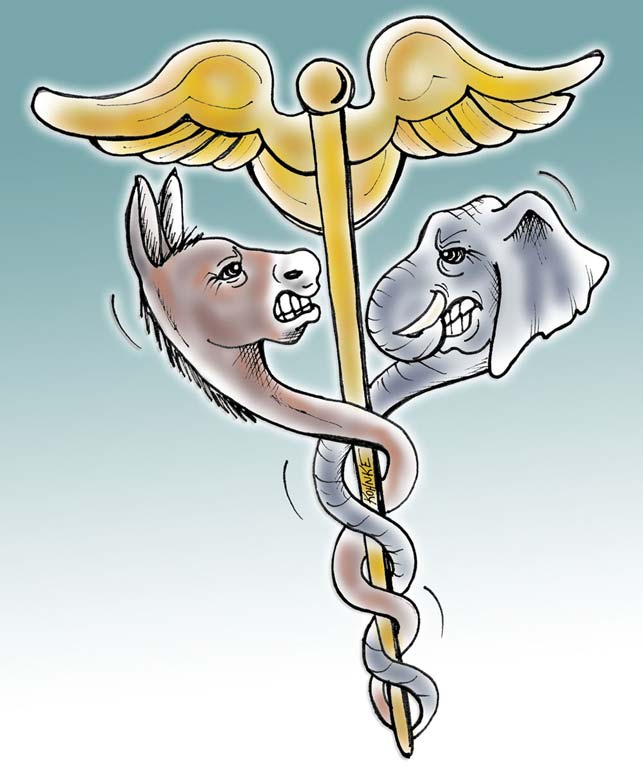
Ironically, the discussion will probably fall under the very American slogan Medicare-for-all, but that's just a catchall for "more and cheaper health care coverage." The reformers will take a variety of approaches to achieving that goal.
All the way to the left, we find Bernie Sanders's vision of a universal, government-run, single-payer system, similar to the ones found in Canada and Scandinavia, only more generous. Inching toward the center, we see proposals for some sort of government-run fallback for the private markets, more akin to what exists in Australia or Germany.
The Sanders model is more popular with young progressives, but it has limited appeal outside the Democratic base. Creating the most generous system in the world would entail the highest price tag in the world -- estimated by economic policy analyst Charles Blahous to cost $32 trillion in new government spending over a decade, even under implausible assumptions about the new system's ability to wring costs out of the health care sector.
Also, while Medicare-for-all polls quite well, getting rid of private insurance doesn't. A recent survey by the Kaiser Family Foundation showed that while two-thirds of voters would support something called Medicare-for-all, only one-third would support it if the policy involved paying more taxes or eliminating private health insurance.
Using Medicare as a public option avoids some of the political difficulties of trying to do a full Canada. But while the challenges of enacting less-totalizing schemes aren't so immediately evident, they're nonetheless considerable.
It's worth noting that this isn't the first time Americans have looked enviously abroad at some other country's universal health care system and tried to import it here. You may remember the last time it happened: 10 years ago, when the Obama administration put together its landmark health care plan.
That plan was designed along roughly the same lines as systems in Switzerland and the Netherlands, both of which have achieved universal coverage while spending a substantially lower fraction of their national income than America does. Yet, when the United States implemented the same structure -- mandatory private insurance that's subsidized for lower-income people -- it didn't work here the way it did there. Nine years in, we're spending almost 40 percent more on health care than the Swiss and 70 percent more than the Dutch. Meanwhile, almost 15 percent of the U.S. population lacks health insurance.
You can point to various reasons for that: court decisions, Republican obstruction or flaws in the law itself, which had a much weaker mandate and cost controls than the Dutch or Swiss models. But then, that's the point: Attempts to reform the American health-care system will be undertaken within the constraints of the American political system. We can't import Dutch politicians and voters -- or the Germans or Australians or Canadians -- to get the job done for us.
The American political system is more fragmented, and easier for interest groups to lobby, than most other systems in the developed world. The nation's health care system is also fragmented -- and huge, accounting for upward of 15 percent of gross domestic product. Any attempt at reforming it would be tremendously expensive, triggering a taxpayer revolt. Reform would also set off alarms because the system is vital to many people as a source of income. When Americans' incomes are threatened by government action, they have an almost unparalleled ability to organize themselves to block it.
And so, the last time around, Democrats passed a weak, flawed version of other systems, because American voters wouldn't stand for a stiff mandate or stiff new taxes to pay for subsidies. Instead of imposing robust cost controls that would threaten the income of politically powerful hospitals and health care professionals, Democrats enacted a bunch of complicated and opaque programs that they hoped would somehow confuse providers into accepting less money for providing the same treatments. Those half-measures didn't work very well.
The next round of health-care reform will encounter exactly the same obstacles. If we try to go the route of Canada or Germany, we will probably end up in roughly the same place we did when we tried to go Dutch: which is to say with a system that looks like nothing else in the world.
Every weekday JewishWorldReview.com publishes what many in the media and Washington consider "must-reading". Sign up for the daily JWR update. It's free. Just click here.
(COMMENT, BELOW)
Megan McArdle is a Washington Post columnist who writes on economics, business and public policy. She is the author of "The Up Side of Down." McArdle previously wrote for Newsweek-the Daily Beast, Bloomberg View,the Atlantic and the Economist.


 Contact The Editor
Contact The Editor
 Articles By This Author
Articles By This Author